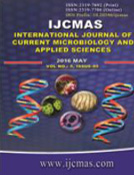


 National Academy of Agricultural Sciences (NAAS)
National Academy of Agricultural Sciences (NAAS)

|
PRINT ISSN : 2319-7692
Online ISSN : 2319-7706 Issues : 12 per year Publisher : Excellent Publishers Email : editorijcmas@gmail.com / submit@ijcmas.com Editor-in-chief: Dr.M.Prakash Index Copernicus ICV 2018: 95.39 NAAS RATING 2020: 5.38 |
Fifteen different tomato genotypes obtained from breeding program were screened to evaluate their tolerant potential toward Fusarium wilt disease under green house conditions. Relation between tolerant potential of tested tomato genotypes toward Fusarium oxysporum fsp.lcyopersici and accumulation of peroxidase enzyme as well as polyphenolic compounds was achieved through bio-chemical analysis investigations using high pressure liquid chromatogram (HPLC) under in vitro conditions. The results showed that the most tolerant tomato genotypes to pathogenic Fusarium showed the highest ability to produce either peroxidases or polyphenolic compounds under the test conditions. Thus the accumulation of antioxidant enzymes, peroxidases, and polyphenols was negative proportionally with reduction of Fusarium wilt disease severity. Although, the highest growth criteria were recorded within genotypes produced the highest amount of both peroxidase and polyphenols. In conclusion, significant variation among the obtained tomato genotypes from the breeding program was detected with regard to their natural tolerant ability against Fusarium oxysporum. According to bio-chemical assay using HPLC, there is, for some extent, an evidence for positive correlation between natural ability of tested tomato genotypes to produce peroxidase and polyphenols compounds and the resistance against Fusarium wilt disease which point to a possible correlation between phenolic and peroxidase anti oxidant enzyme and tolerance potential of tomato genotypes toward hazardous pathogens like Fusarium species.
 |
 |
 |
 |
 |